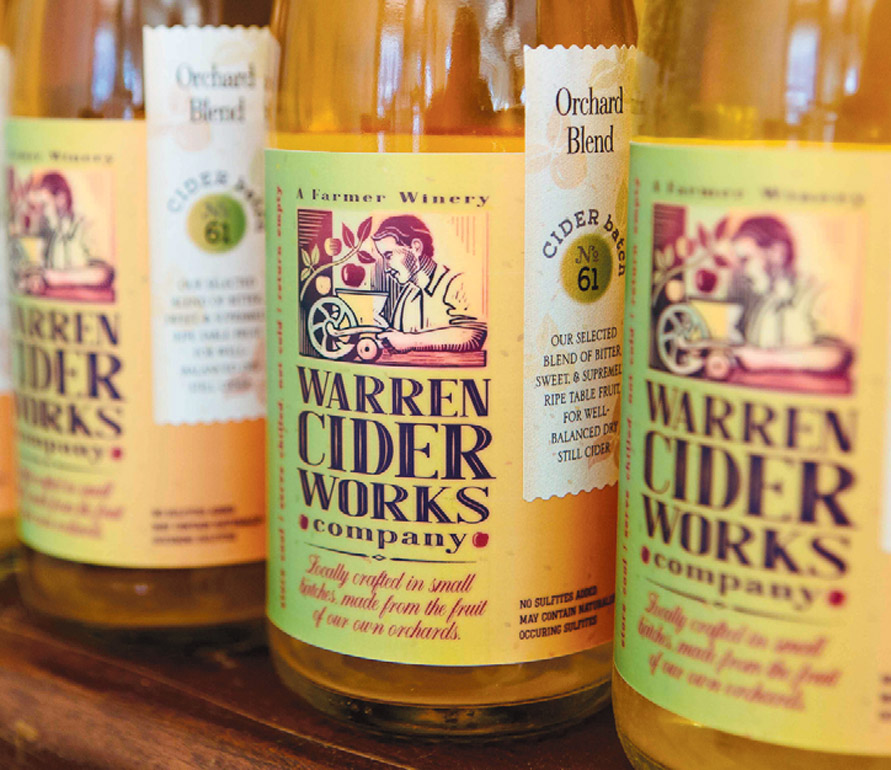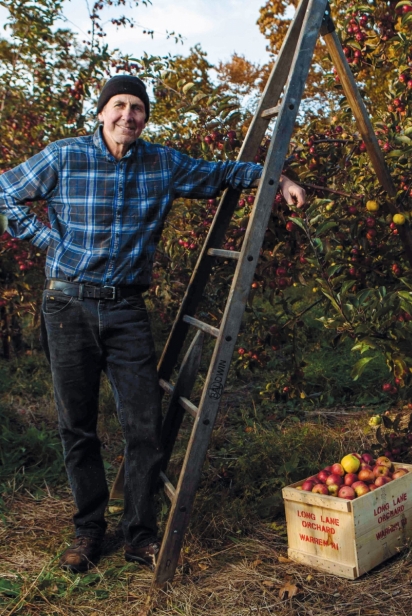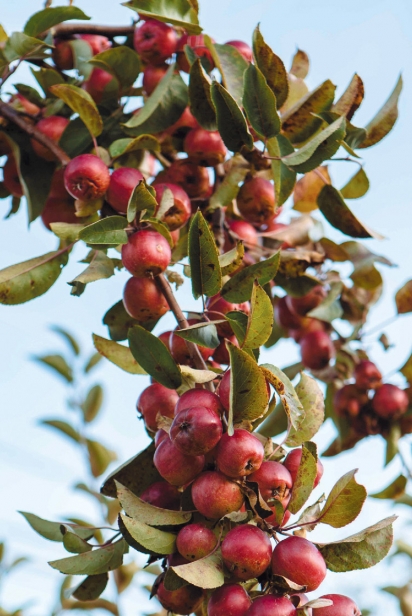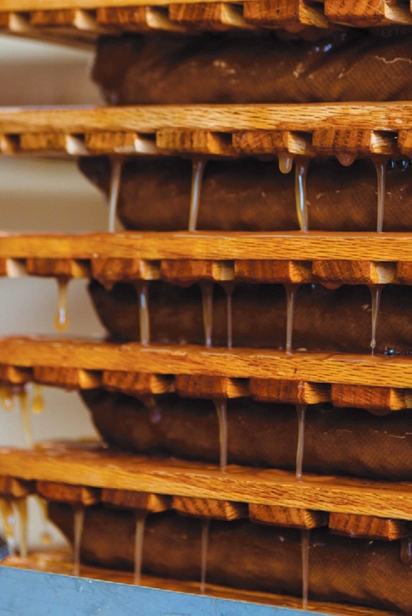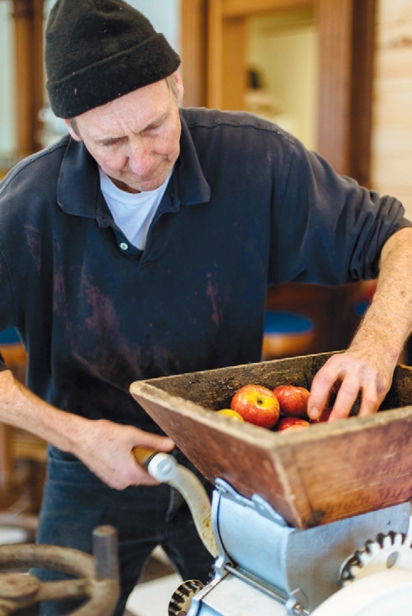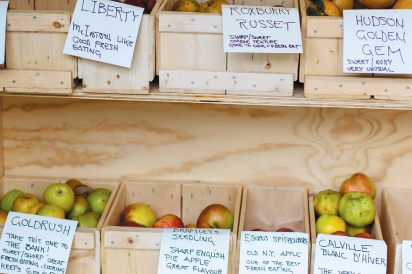Sowams Cider Works Company
Third-Generation Apple Grower Spencer Morris Finds a New Calling as Both Cider Maker and Cider Sommelier
Walking between a row of Bramley and Russet apple trees with Warren orchardist and cider maker Spencer Morris, you can feel his contentment at tending and caring for them. He notes the foot-high screens around the trunks of the semi-standard trees that protect against bark-eating rodents, and the small weed-free circle around them that discourages mice from going after the roots—they have been known to kill trees.
Morris carefully picks small apples from trees that are producing more than one on a stem, so they won’t “over-crop” and not reach their full potential. He points out the trenches he has made to channel the water between the 800 trees, on just three acres. He bushwhacks his way through a thicket of buttercup leaves, telling his visitor: “You should have seen it when it was all yellow—it was like standing on sunshine!”
Morris comes by his love of “all things apple” quite naturally. His grandfather grew apples in the Hudson River Valley, and his mother still runs a small pick-your-own orchard there. As a kid, he didn’t help out much in that enterprise, but something stuck, because he’s now proud of being a third-generation apple grower.
Morris moved to Warren in 1992 with his wife, artist Allison Newsome (whose painting of an apple tree hangs in the cidery). He started planting trees at his Long Lane Orchard seven years ago, and he’s now up to 40 varieties, including several French ones (such as Dabinett and Michelin) and British varieties (such as Brown Snout). He opened Warren Cider Works in October 2018 (now renamed Sowams Cider Works Company) and, after his first year of sales, he’s particularly excited about a hyper-local cider made from Rhode Island varieties—Rhode Island Greening, Dyer and Peck’s Pleasant.
“The traditional varietals, such as Roxbury Russet and Rhode Island Greening, go back to the 1670s,” explains Morris. “They have many qualities that make a great cider, including the balance of sugar and tannin.”
“I’m always looking for ones with great levels of tannin, not necessarily those that would appeal for the table,” he says. “And I’m also looking for ones the colonials might have used.”
Domesticated apples are said to have started in Kazakhstan, from whence the Romans found them and brought them to the British Isles; from there to America, and then across to Japan, Australia and New Zealand. Up until Prohibition, apples—and the hard cider from them—were an important part of an American farmer’s productivity, because they could grow on marginal land and still produce a valuable crop. After Prohibition, the popularity of cider faded, partly due to the changing nature of farming overall, as well as a cultural shift towards urbanization.
In the last 20-plus years, cider-making has come back, initially in the Northeast and now, in the last 10 years, cideries have sprung up all around the country.
“Places that are large commercial cider-making operations, like Woodchuck or Angry Orchard,” Morris says, “are looking for consistency— for a sweet, bubbly, apple-y flavor. But they were category builders, by positioning it with beer.”
“I’m a grower as well as a cider maker,” he emphasizes, “and I sell non-consistency. If you expedite production, as in commercial cideries, you lose a lot of biological nuance and flavor notes. They sometimes make cider in one month; it takes me a year.”
Morris starts harvesting in mid-September; pressing starts mid-October and runs to the end of December. The fermentation takes six to nine months. Morris also runs a seasonal apple store from the Warren location, offering customers seven to 10 varieties of eating and cooking apples at any one time, well into January, with late-harvest/ long-keeping apples such as Gold Rush and Northern Spy.
The apples harvested for cider are first “sweated,” or allowed to dehydrate and mature a bit after they are picked. That “sweating” time varies from two weeks (Chestnut Crab) to two months (Newton Pippin).
They are pressed by repurposed machine presses, two of them 12-ton presses; the other two are 40-ton. They are all hand-operated by Morris: “A 180-pound person puts 40 tons of pressure on the apple. Very slowly, every now and again, you walk over and pull on the handle.”
The juice then goes into 14-gallon glass demijohns encased by plastic “buckets” so that the jars will have handles. So far, this remains a one-man operation.
After the juice is in the glass jars, Morris may allow it time for wild fermentation, from the natural yeasts on the apples, or he may manage it more reliably with an inoculation of champagne yeast.
“When I bottle it, I want it stabilized and matured,” he says. “I don’t add sulfites, and I don’t pump it. There’s not a lot of agitation.”
He also doesn’t add any sweetener during fermentation—the sweetness may vary, but that’s the “non-consistency” he values. Morris’s apples are not organic, but he sprays approximately 25% of what commercial orchards do, and he stops spraying in mid-August.
Morris is a self-taught cider maker who attended a seminar at Cornell University, and a self-taught apple grower who sought advice from the University of Rhode Island. He’s also a trained architect (RISD grad) who makes a living by designing and building beverage dispensing equipment for restaurants.
Now 63, Morris admits coming to this cider “adventure” a bit late in life, but he’s glad to have gained a farmer-winery license for his orchard and cidery: “It provides me with a lot of liberty.”
In addition to growing the apples and making them into cider, Morris has a tasting room where he offers a shifting quartet of ciders to taste and bottles for sale. One section of this space is as rustic as can be, with orchard boxes for tables, wooden café chairs, barn-board paneling and an apple tree limb as a room divider.
But dominating the other half of the space is an L-shaped wooden bar, with swivel seats that came from the former Blue Point Restaurant in Providence. Morris had done some carpentry for the owners and when the Blue Point closed, he hung on to the bar, which had originally come from a Victorian-era Fall River saloon.
Once behind the bar, Morris switches hats, from farmer to cider sommelier, pouring samples of four ciders: “Reds,” “Baldwin,” “Roxbury Russet” and the very French “Calville Blanc D’Hiver.” The Reds blend Macoun, Liberty, Cortland and Jonamac apples, with a smooth, apple-y taste. The Baldwin has the enticing scent of Baldwin apples, with a pleasing dryness. The Roxbury Russet has a richness and a depth that is quite addictive. And the Calville cider—although the apple itself is a customer favorite at the apple stand—just doesn’t match the Russet’s layers of flavor.
As he pours and watches for reactions, Morris spills over with apple lore. The Roxbury Russet, from Massachusetts, was the first apple to be named in the colonies; the Rhode Island Greening, the second.
“And it’s been said that the Greening can be traced back to the Garden of Eden,” Morris says, with a grin.
Though there are distinctive English, French, German and Spanish styles of hard cider, Morris is striving for “a great American cider.”
“We are trying to discover which apples are most productive in our environment,” he reflects. “This is my first year, so I’m just getting an idea of what really works.”
Sowamns Cider Works Company
98 Child St., Warren, RI
For business hours and information about the cidery, visit SowamsCiderWorks.com.


